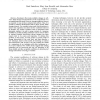269 search results - page 16 / 54 » Model-Checking Software Using Precise Abstractions |
120
click to vote
ICST
2010
IEEE
15 years 19 days ago
2010
IEEE
Abstract—Developers often make multiple changes to software. These changes are introduced to work cooperatively or to accomplish separate goals. However, changes might not intera...
149
click to vote
PE
2011
Springer
14 years 9 months ago
2011
Springer
Structured QBDs by Abstraction Daniel Klink, Anne Remke, Boudewijn R. Haverkort, Fellow, IEEE, and Joost-Pieter Katoen, Member, IEEE Computer Society —This paper studies quantita...
113
click to vote
ASE
2008
15 years 2 months ago
2008
Model checkers were originally developed to support the formal verification of high-level design models of distributed system designs. Over the years, they have become unmatched in...
111
click to vote
PEPM
2010
ACM
15 years 11 months ago
2010
ACM
Pushdown systems are well understood as abstract models of programs with (recursive) procedures. Reps et al. recently extended pushdown systems into weighted pushdown systems, whi...
116
click to vote
UML
2005
Springer
15 years 7 months ago
2005
Springer
Use cases are a popular method for capturing and structuring software requirements. The informality of use cases is both a blessing and a curse. It enables easy application and lea...

